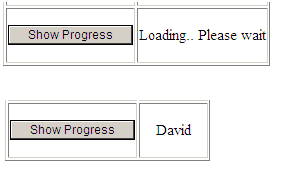The events ajaxStop fires
only when all the Ajax requests in the page complete their execution, while the
ajaxSuccess get fired for every individual Ajax request which executes
succesfully.
The ajaxStop event handler does not provide any parameters since it gets fired only after all the Ajax requests in the page get completed, whereas the ajaxSuccess event handler provides the request object and a set of settings as parameters which can be used to identify the request for which the ajaxSuccess event got fired.
The syntax for the ajaxSuccess event handler is as follows.
ajaxSuccess (function(objEvent, objXHR, objSettings))
objEvent – The event Object
objXHR - The XMLHttpRequest Object
objSettings - Options used to make the Ajax Request
The syntax for the ajaxStop event handler is as follows.
ajaxStop(function())
Related Post
The ajaxStop event handler does not provide any parameters since it gets fired only after all the Ajax requests in the page get completed, whereas the ajaxSuccess event handler provides the request object and a set of settings as parameters which can be used to identify the request for which the ajaxSuccess event got fired.
The syntax for the ajaxSuccess event handler is as follows.
objEvent – The event Object
objXHR - The XMLHttpRequest Object
objSettings - Options used to make the Ajax Request
The syntax for the ajaxStop event handler is as follows.
ajaxStop(function())
Related Post
jquery
ajax Error Handling
jquery ajax Error Handling Example
jQuery Ajax request progress indicator events
jQuery Ajax request progress events Example
jquery ajaxStart
jquery ajaxStop
jquery ajaxComplete
jquery ajaxSuccess
jquery ajaxSuccess vs ajaxComplete
jquery ajaxStop vs ajaxComplete
jquery ajaxStop vs ajaxSuccess
jquery ajax Error Handling Example
jQuery Ajax request progress indicator events
jQuery Ajax request progress events Example
jquery ajaxStart
jquery ajaxStop
jquery ajaxComplete
jquery ajaxSuccess
jquery ajaxSuccess vs ajaxComplete
jquery ajaxStop vs ajaxComplete
jquery ajaxStop vs ajaxSuccess
